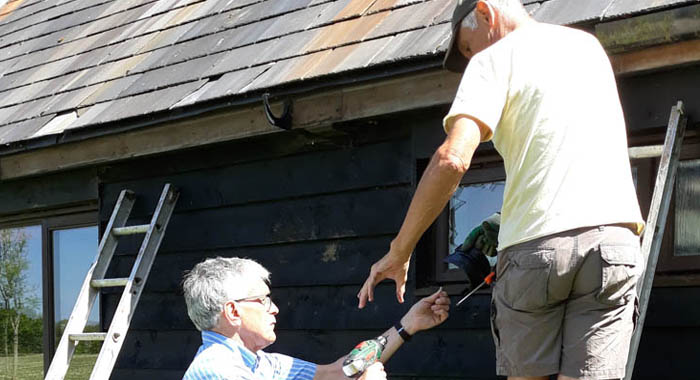Councillors Roles and Responsibilities
Code of Conduct for Councillors
Local authorities are required to adopt a code of conduct, which sets out rules governing the behaviour of their Members and satisfies the requirements of the Localism Act 2011. All elected, co-opted and independent members of local authorities, including parish councils, are required to abide by their own, formally adopted, code. The code of conduct seeks to ensure that members observe the highest standards of conduct in their civic role. The code is intended to be consistent with the seven principles:
Seven general principles of conduct
Selflessness
Holders of public office should act solely in terms of the public interest. They should not do so in order to gain financial or other material benefits for themselves, their family, or their friends
Holders of public office should act solely in terms of the public interest. They should not do so in order to gain financial or other material benefits for themselves, their family, or their friends
Integrity
Holders of public office should not place themselves under any financial or other obligation to outside individuals or organisations that might seek to influence them in the performance of their official duties.
Holders of public office should not place themselves under any financial or other obligation to outside individuals or organisations that might seek to influence them in the performance of their official duties.
Objectivity
In carrying out public business, including making public appointments, awarding contracts, or recommending individuals for rewards or benefits, holders of public office should make choices on merit.
In carrying out public business, including making public appointments, awarding contracts, or recommending individuals for rewards or benefits, holders of public office should make choices on merit.
Accountability
Holders of public office are accountable for their decisions and actions to the public and must submit themselves to whatever scrutiny is appropriate to their office.
Holders of public office are accountable for their decisions and actions to the public and must submit themselves to whatever scrutiny is appropriate to their office.
Openness
Holders of public office should be as open as possible about the decisions and actions that they take. They should give reasons for their decisions and restrict information only when the wider public interest clearly demands.
Holders of public office should be as open as possible about the decisions and actions that they take. They should give reasons for their decisions and restrict information only when the wider public interest clearly demands.
Honesty Holders of public office have a duty to declare any private interests relating to their public duties and to take steps to resolve any conflicts arising in a way that protects the public interest.
Leadership
Holders of public office should promote and support these principles by leadership, and by example, and should act in a way that secures or preserves public confidence.
Holders of public office should promote and support these principles by leadership, and by example, and should act in a way that secures or preserves public confidence.
The Chairman
The role of the Chairman is to Chair the meetings in an unbiased leadership role, to ensure smooth running of the meetings and that effective and lawful decisions are taken, whilst adhering to the Standing Orders, assisted by the Clerk.
To determine that the meeting is properly constituted, a quorum is present and employees act in compliance with the local policy guidelines and Standing Orders as set by the Parish Council.
If present at a council, the chairman must preside, and he has control of its procedure for the purpose of enforcing the law and good order.
The Chair is elected by the members of the Council at the Annual Council meeting and serves for twelve months.
The Clerk
The Clerk is Responsible Officer employed by the Council (under section 112 (1) of the Local Government Act1972) to provide administrative support for the Council's activities.
The Clerk is often called upon by the Chairman of the meeting to give guidance on a range of formal and informal matters. The Clerk acts as a conduit for information to the Parish, Parish Councillors, the Chairman and external agencies.
It is a Clerks duty to initiate and issue a signed Summons and agenda, to send to every member of the Parish Council prior to the meeting and publicise within the Parish (within the legal times-scales). The Clerk will often liaise with the Chairman regarding items on the agenda. It is a legal requirement to produce minutes from the meetings and often it is the Clerk who has a duty to issue the draft minutes. These will be presented at the next meeting and the Clerk has a responsibility to ensure they are signed by the Chairman.
The Clerk will advise and give clear guidance to the Chair and Parish Council members on Local Policy Matters, ethical and procedural matters before decisions are reached, even when that guidance may be unpalatable. In Winterslow the Clerk is also our Responsible Financial Officer and therefore handles all financial transactions, bank accounts, financial reporting, VAT, and budget administration.
The Councillors
All Councillors are elected by the electors of the Parish every four years (May 2017). For a vacancy there may be an election or a Councillor may be co-opted onto the Parish Council by a majority vote.
Within 28 days of election, or co-option to the Council, all Councillors have a duty to register financial and other interests by completing a Code of Conduct form and also register their Interests on the Local Government Authority (Wiltshire Council) website.

The primary purpose of a Councillor is to represent the views of all residents within the parish
A Councillor has a duty to attend meetings and represent the views of all the electorate in the Parish and remain unbiased in making informed decisions upon hearing all of the information presented to them at meetings.
A Councillor has a responsibility for raising matters that the council can consider and then take appropriate decisions (by vote).
A Councillor has a responsibility to contribute to the formation of the Council's policies and plans by active involvement in council meetings, committees and working parties.
Councillors will often take personal responsibility for a specific 'portfolio' and/or a specific project in order to improve the effectiveness of the Council.
The Council Parish and Town Councils are elected corporate bodies who work within the realms of the law and can only do what legislation requires or permits them to do.
Council Roles and Responsibilities
To give views, on behalf of the community, on planning applications and other proposals that affect the parish.
Undertake projects and schemes that benefit local residents.
Work in partnership with other local and statutory bodies to achieve benefits for the parish.
Alert relevant authorities to problems that arise or work that needs to be undertaken.
Act as a conduit for information in other tiers of local government.
To establish policies for action and deciding how money will be raised and spent on behalf of the community; ensuring public money is spent lawfully whilst achieving the best value for money.
Latest Councillors Reports
The members of Winterslow Parish Council have individual areas for which they are responsible. At the Annual Parish Council meeting the Councillors choose an area they have an interest and then take the lead in this area. There maybe one or more Councillors involved as well as the Parish Clerk.
The list of Councillors responsibilites are available on the Policies page of the Document section.
Documents
Agenda and Minutes, Maps and Planning info. They are all held in our Documents section.
Visit the Documents section here

Our cookie policy
Your privacy and data protection is important to us and we take every care to abide by present UK and EU regulation. If website functionality requires it, we may use cookies - small pieces of data sent to your computer and used by your web browser - to help identify your browsing behaviour. If you are not happy with our using cookies, please leave our website now. Click here for more information on how we manage your data, protect your privacy and manage cookies.
Your privacy and data protection is important to us and we take every care to abide by present UK and EU regulation. If website functionality requires it, we may use cookies - small pieces of data sent to your computer and used by your web browser - to help identify your browsing behaviour. If you are not happy with our using cookies, please leave our website now. Click here for more information on how we manage your data, protect your privacy and manage cookies.

